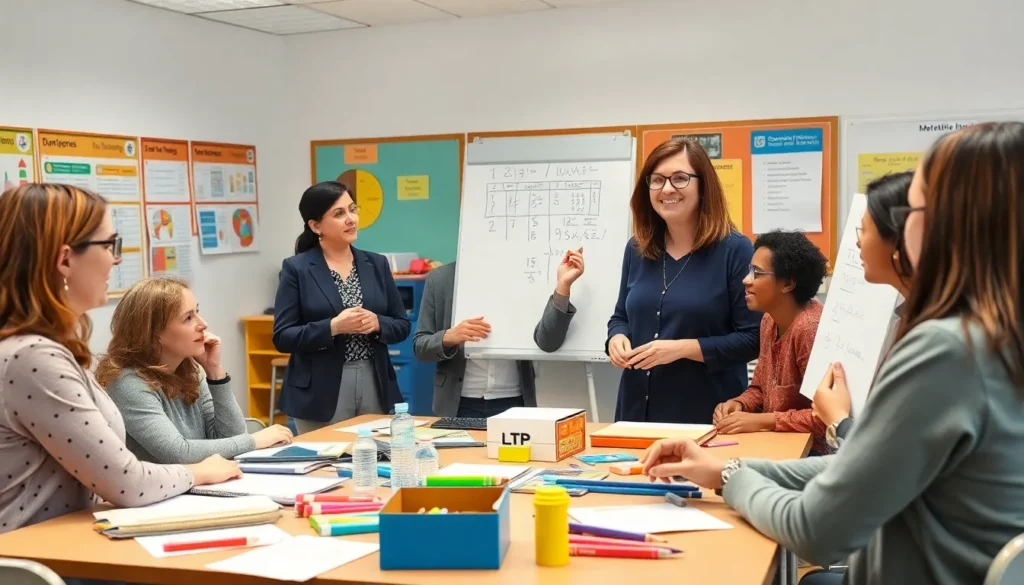In a world where numbers reign supreme, math professional development is the secret sauce that keeps educators sharp and students engaged. Imagine a classroom where teachers confidently tackle the trickiest equations while students eagerly raise their hands, ready to solve the next math mystery. Sounds like a dream, right? Well, it doesn’t have to be!
Math Professional Development
Math professional development plays a crucial role in equipping educators with necessary skills and strategies. This ongoing process focuses on improving teachers’ understanding of mathematical concepts, which boosts their confidence in delivering lessons. Engaging in targeted training creates an environment where teachers effectively inspire students to tackle complex problems.
Many professional development programs utilize collaborative approaches. Educators often work together to share best practices and resources, fostering a community of support. Workshops and seminars provide opportunities for hands-on learning and application of latest teaching techniques. These sessions emphasize practical methodologies that educators can immediately implement in their classrooms.
Furthermore, research shows that sustained professional development correlates with improved student outcomes. Students exposed to teachers who continually enhance their skills exhibit higher levels of mathematical proficiency. Programs that include ongoing mentorship have proven particularly effective, allowing educators to seek guidance and feedback throughout their teaching journey.
In addition, technology integration remains an essential component of math professional development. Familiarity with various educational tools enables teachers to engage students in innovative ways. By accessing online platforms, educators can join webinars, access resources, and connect with experts regardless of location.
Collectively, these professional development opportunities create a foundation for teachers to excel. The ultimate goal involves building educators’ capabilities to deliver engaging math instruction, which directly impacts student enthusiasm and participation in learning activities. This dynamic contributes to a positive classroom atmosphere where both teachers and students thrive.
Importance of Math Professional Development

Math professional development plays a crucial role in educators’ growth and student success. This continuous improvement process strengthens both teaching practices and student engagement.
Enhancing Teacher Skills
Skill enhancement occurs through targeted training and workshops. Educators gain deeper insights into mathematical concepts. Workshops often provide hands-on experiences that promote active learning. Collaborative platforms foster sharing of innovative techniques. Educators also learn to integrate technology effectively into lessons. These resources equip teachers with strategies to present complex ideas clearly. Sharing best practices among peers bolsters confidence while exposing teachers to diverse teaching approaches. Increased competence encourages more dynamic and effective lesson delivery.
Improving Student Outcomes
Improved student outcomes directly result from enhanced teacher effectiveness. Research indicates that ongoing professional development significantly raises student performance. When teachers feel confident, they cultivate a more stimulating learning environment. Engaged students are more likely to participate in problem-solving activities. Also, effective training contributes to students’ critical thinking skills and overall math proficiency. Mentorship programs within professional development bolster these results further, creating a supportive environment for educators. Ultimately, this investment in teaching proficiency translates into greater academic success for students.
Types of Math Professional Development
Math professional development comes in various forms, each designed to enhance educators’ skills and knowledge effectively. Engaging in these types ensures that teachers are well-equipped to foster student success.
Workshops and Conferences
Workshops and conferences provide interactive opportunities for educators. Participating in these events allows teachers to explore innovative teaching strategies and methodologies. Collaborating with peers during hands-on sessions often leads to increased confidence in delivering lessons. Engaging discussions spark new ideas about integrating math concepts into the curriculum. Research shows that workshops focused on specific areas of mathematics have a significant impact on student learning outcomes. Attendees can network with experts, enhancing their professional community.
Online Courses and Webinars
Online courses and webinars offer flexible learning options for educators. These virtual platforms accommodate diverse schedules and learning preferences. Teachers can access resources from top experts in mathematics education, expanding their understanding of complex topics. Interactive components in webinars promote real-time engagement and knowledge sharing. Courses often feature practical applications, allowing educators to implement strategies immediately in their classrooms. Many studies highlight the effectiveness of online professional development in improving teaching practices. This accessibility ensures that teachers continually develop their skills despite geographical constraints.
Effective Strategies for Math Professional Development
Math professional development thrives on collaboration and ongoing support. Implementing effective strategies enhances educators’ skills and boosts student engagement.
Collaborative Learning Communities
Collaborative learning communities play a vital role in math professional development. Educators foster relationships through these communities, sharing best practices and resources. Teachers engage in discussions that deepen their understanding of math concepts. This environment encourages the exploration of innovative strategies, allowing educators to learn from one another. Regular meetings and collaborative projects provide opportunities to reflect on their teaching practices. Research highlights that collaboration leads to improved teaching effectiveness and student outcomes, making these communities essential.
Continuous Support and Coaching
Continuous support and coaching provide the necessary guidance for educators during math professional development. Coaches work closely with teachers, offering tailored assistance to address individual needs. This support includes modeling lessons, providing feedback, and facilitating reflective conversations. Teachers benefit from a safe space to discuss challenges and collaborate on solutions. Sustained coaching positively impacts teachers’ confidence and instructional practices. Studies indicate that ongoing support is a key factor in enhancing educators’ effectiveness, further linking it to improved student performance.
Challenges in Math Professional Development
Math professional development faces several challenges that can hinder its effectiveness.
Time Constraints
Time constraints pose significant barriers for educators participating in professional development. Many teachers juggle multiple responsibilities, leaving limited time for additional training. Busy schedules often result in reduced attendance at workshops and seminars, limiting opportunities for skill enhancement. Schools that prioritize professional development can create designated time slots during the academic day. Successful programs have included scheduled collaboration periods, allowing educators to engage without sacrificing instructional time. Highlighting the importance of these sessions underscores their role in fostering effective teaching practices.
Resistance to Change
Resistance to change often impacts the implementation of new strategies in math professional development. Some educators may feel comfortable with traditional teaching methods, hesitant to adopt innovative approaches. This reluctance stems from a lack of familiarity or confidence in utilizing new techniques. Addressing these concerns through targeted support and coaching promotes acceptance and encourages experimentation. Successful initiatives often share success stories from peers, illustrating the positive impact of new strategies on student outcomes. Creating an environment that celebrates growth can motivate educators to embrace change and enhance their teaching practices.
Conclusion
Math professional development is essential for creating an engaging and effective learning environment. By equipping educators with the necessary skills and strategies, it fosters confidence and enhances teaching practices. This ongoing growth not only benefits teachers but also significantly impacts student outcomes.
The collaborative nature of professional development encourages the sharing of innovative teaching techniques. As educators engage in workshops and communities, they cultivate a culture of continuous improvement. This investment in teacher proficiency ultimately leads to a classroom atmosphere where both teachers and students thrive.
Prioritizing math professional development is crucial for schools aiming to boost academic success. By addressing challenges and providing tailored support, educators can embrace new strategies that inspire enthusiasm for math among students.

